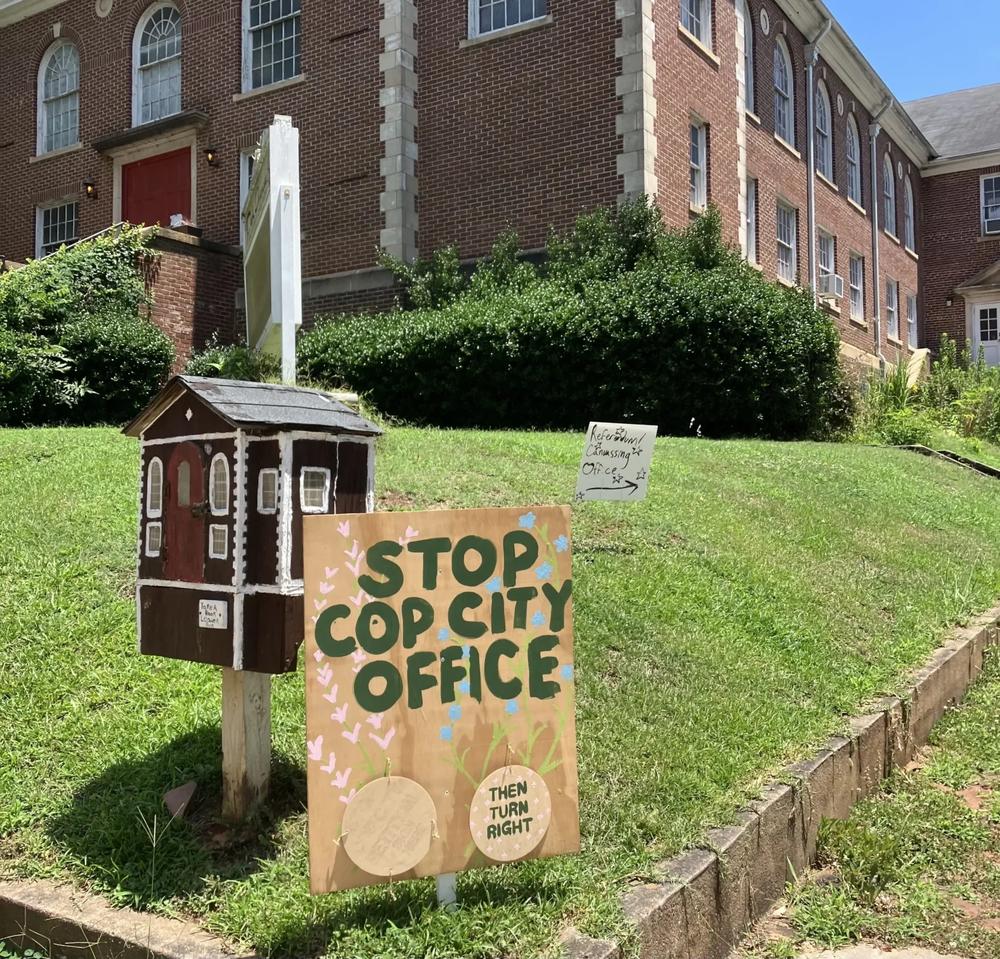
Caption
The Eastside Office in Grant Park at Park Avenue Baptist Church for the Vote to Stop Cop City referendum petition drive.
Credit: Rough Draft Atlanta

The Eastside Office in Grant Park at Park Avenue Baptist Church for the Vote to Stop Cop City referendum petition drive.
The city is fighting back against a federal judge’s ruling last week that said Atlanta’s residency requirements for signature collectors in the “Vote to Stop Cop City” referendum petition drive likely violates their First Amendment rights.
Attorneys for the city are asking U.S. District Court Judge Mark H. Cohen to suspend his July 27 order that also restarted the 60-day deadline for collecting roughly 70,000 signatures needed to get the proposed referendum on the ballot, according to documents filed Monday.
Organizers of the Vote to Stop City coalition begin collecting signatures June 21 and said last week they had surpassed 30,000 signatures. They received the new petition removing residency requirements for signature collectors on July 27 with the added 60-day deadline. Cohen’s ruling said valid signatures already collected would be counted as part of the new petition.
Cohen said in his order that the plaintiffs would likely succeed in showing that the city’s residency requirement for signature gatherers violates the First Amendment.
The city “respectfully disagrees” with Cohen’s ruling that it is violating anyone’s First Amendment rights in this case, according to its appeal filed July 28.
Cohen’s order to issue new petitions without residency requirements actually violates state law and “poses a number of problems, not the least of which is potential legal action by the State against the City,” the city’s attorneys argued.
“The residency requirement is based on a 34-year-old state statute; the City did not invent this requirement specifically for this petition effort, it was simply complying with state law,” the city’s attorneys argued in the appeal.
Cohen’s order to restart the 60-day deadline “implies a degree of punishment to the City for its compliance with state law, or as compensation toward the Plaintiffs,” according to the city.
A city revising its referendum petition requirements in the middle of the process such as extending a deadline to collect signatures is not addressed by state law, the city argued, and the issue would likely have be settled by the 11th U.S. Circuit Court of Appeals.
Cohen also discounted the argument that if the city’s residency requirement in the state’s referendum law is unconstitutional, then the entire referendum law is unconstitutional. City and state law say invalid portions of a law can be removed — or “severed” — while the rest of the law remains valid, according to Cohen.
Atlanta’s attorneys said in their appeal while the 11th Circuit could affirm the First Amendment ruling, it could also reverse “on the severability issue.”
“Under this scenario, the petition supporters will have spent 30–60 days funding and circulating a futile petition, because the referendum process will no longer exist,” the city’s attorneys argued.
Going to the 11th Circuit Court to decide on Cohen’s ruling “invites significant confusion, delay, and expense” and would “frustrate both the city and petition supporters,” according to the city’s attorneys.
The city is represented in the fight against the referendum petition fight by attorneys with the Bondurant Mixson & Elmore firm, including partner Robert “Robbie” Ashe. Ashe represented the city against the Buckhead City Committee in its failed attempt to secede from the city of Atlanta.
Organizers behind the “Vote to Stop Cop City” coalition and petition drive said the city should stop its appeals and let the people decide on the planned training center.
“Judge Cohen was very clear in his ruling. We expect the same from any appeal,” Mary Hooks, tactical lead for the referendum, said in a statement to the Atlanta Journal-Constitution. “We’re disappointed that the Mayor’s Office is choosing to waste tax dollars fighting to limit Atlanta residents’ democratic right to decide the fate of Cop City.”
This story comes to GPB through a reporting partnership with Rough Draft Atlanta.